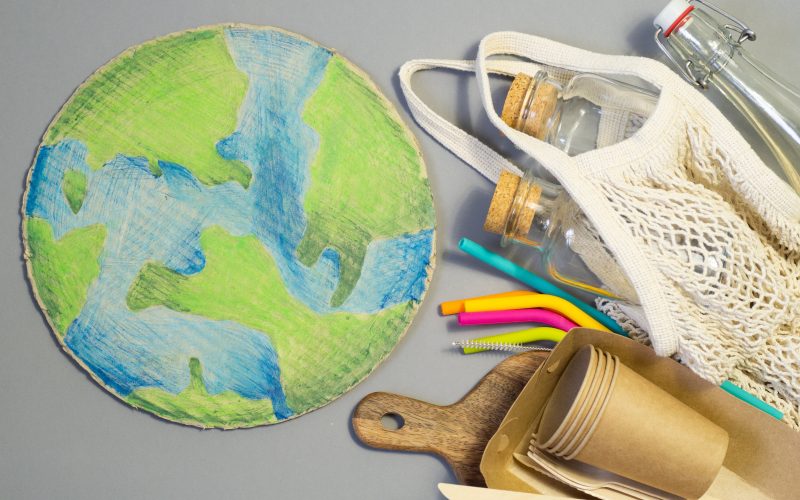Sustainable products aim to reduce environmental impact and enhance resource use through renewable materials, waste reduction, and energy efficiency. Examples include eco-friendly food packaging and reusing items at home, which help the environment and combat climate change. Small changes in consumer habits can foster sustainability.
Subscribe to Green Nest News for eco-friendly living tips and local initiatives. Together, we can make a difference—your journey toward sustainability starts now!
What Are Sustainable Products
Sustainable products reduce environmental impact through renewable resource inclusions and the use of eco-friendly materials. Biodegradable packaging, solar-powered devices, and plant-based fabric are innovations to lead the way toward greener consumer choices.
1. Definition and key characteristics
 Sustainable products are engineered to not cause any adverse environmental impact across the lifecycle. A frequent phrase in marketing is “green,” so always check legitimate claims of sustainability. Good examples include compostable cutlery and clothing made from recycled materials, which are safe for human consumption and the environment. Sustainability also involves ethical sourcing, fair labor, and social responsibility, such as in upcycled food products that utilize surplus ingredients.
Sustainable products are engineered to not cause any adverse environmental impact across the lifecycle. A frequent phrase in marketing is “green,” so always check legitimate claims of sustainability. Good examples include compostable cutlery and clothing made from recycled materials, which are safe for human consumption and the environment. Sustainability also involves ethical sourcing, fair labor, and social responsibility, such as in upcycled food products that utilize surplus ingredients.
2. Difference from conventional products
Unlike most typical products, sustainable alternatives utilize eco-friendly materials as well as green production processes. They have integrated renewable resources, such as bamboo and organic cotton, to replace petroleum-based plastics. The demand for biodegradable plastics is on the rise, and even the market projections are indicated to show major growth in the next five years.
Conventional products have higher carbon emissions and waste. Although sustainable products are costly in the short term, they are durable and environmentally friendly. For example, shoes made from 90% recyclables are as good as any other shoe but prevent more landfill waste.
3. Role in environmental conservation
The use of sustainable products contributes a significant amount toward the reduction of pollution and conserving resources. A study suggests that a switch toward sustainable production would reduce greenhouse gases by 36-38%. As consumers grow to be aware of climate change, 64% of consumers think about sustainability before purchasing. Biodiversity is preserved through saving natural resources as they reduce the consumption of the extraction and habitats.
Importance of Sustainability
Consumer preference is gravitating toward green products, hence causing the industries to be greener. Proper options, like biodegradable packaging and solar-powered devices, are reducing waste and carbon footprints, the practicality and demand for which are propelling toward environmental stewardship on a wider level.
1. Addressing resource depletion
Overconsumption threatens the availability of such basic resources as water and fossil fuels. Half of the 345 billion gallons of water consumed in the United States each day is reportedly wasted. Increasing reliance on fossil fuels hastens resource depletion and environmental deterioration.
It goes a long way in conserving resources by making use of resource-conserving options like energy-saving appliances and water-conserving fixtures. Decisions related to purchasing contribute toward future sustainability and thus, such practices need to be promoted.
2. Reducing environmental impact
Sustainable products manage to reduce environmental damage by using nature-friendly materials and reducing carbon footprints. For example, recyclable packaging reduces landfill waste. Promoting local goods and reusable materials further lowers the impact on the environment, helping to protect ecosystems from pollution.
3. Supporting ethical practices
Companies that emphasize fair labor and transparent supply chains promote social responsibility. Consumers who support these brands contribute to improved wages and working conditions worldwide. Fair Trade-certified products exemplify such ethical commitments, fostering global economic equity.
Categories of Sustainable Products
This ever-growing green market offers several green substitutes for various kinds of businesses and industries. The consumer needs fall under technology clothing, home essentials, personal care, and sustainable choice.
1. Eco-friendly Technology and Gadgets
 The third element is energy-efficient technology, an important contributor to sustainability. Energy savings and a sustainable lifestyle are achieved through the use of smart thermostats, LED lightbulbs, and solar chargers. Energy Star certification has become more than 50% electricity efficient on modern appliances like refrigerators and washing machines that save energy dollars and environmental impact.
The third element is energy-efficient technology, an important contributor to sustainability. Energy savings and a sustainable lifestyle are achieved through the use of smart thermostats, LED lightbulbs, and solar chargers. Energy Star certification has become more than 50% electricity efficient on modern appliances like refrigerators and washing machines that save energy dollars and environmental impact.
2. Ethical Clothing and Accessories
The practice of sustainable fashion is increasingly popular with companies as they take steps to add a greener business to their portfolios. Some companies include Patagonia and Eileen Fisher, which make use of organic cotton, hemp, and recycled polyester. Organic cotton helps to decrease pesticide usage, and the recycling process saves waste from landfills. A capsule wardrobe focuses on quality over quantity and thus encourages sustainable fashion.
3. Green Home and Kitchen Essentials
Eco-friendly household items come in a fusion of functionality and sustainability. Reusable silicone bags, bamboo utensils, and compostable sponges all reduce the reliance on single-use items that end up tossed in the trash. Natural cleaning products offer safer alternatives without all the chemicals, which aren’t exactly great for health. Long-lasting cookware and furniture reduce unnecessary consumption.
4. Clean Beauty and Personal Care Items
Clean beauty companies rely on organic materials and green packaging. The brand Tsuno produces organic cotton hygiene products, with no use of bleach and synthetic chemicals. Environmentally conscious products also include refillable packaging and paraben-free formulas.
5. Sustainable Fitness and Outdoor Gear
With their eco-friendly material, fitness wear products provide benefits to customers and the environment. Products are like recycled rubber yoga mats and stainless steel water bottles that reduce wastefulness. A brand like REI ensures responsibility in sourcing materials and ethical manufacturing methods.
6. Pet Products with Eco-conscious Design
The growing pet industry increasingly incorporates sustainable alternatives. Biodegradable waste bags and upcycled pet treats contribute to greener consumption habits. Brands emphasizing sustainability allow pet owners to make responsible choices while caring for their animals.
7. Creative and Educational Kids’ Items
Production of toys also consumes a large amount of raw material, which creates huge plastic waste. Opting for sustainable alternatives, such as wooden toys or recycled plastic products, reduces the environmental impact. Eco-conscious values can be further promoted in more young generations using educationally oriented toys.
Embracing Sustainability: Making Eco-Friendly Choices for a Better Tomorrow
Sustainable products fulfill consumer needs and help the environment by reducing waste and encouraging ethical practices. Mindful buying fosters a healthier planet and a sustainable market. Small actions can make a big difference, so it’s important to know about sustainable options.
Every purchase can benefit the environment and build a better future. Join the Green Nest News community for tips on green living and inspiring stories. Sign up today to help create a greener future!

